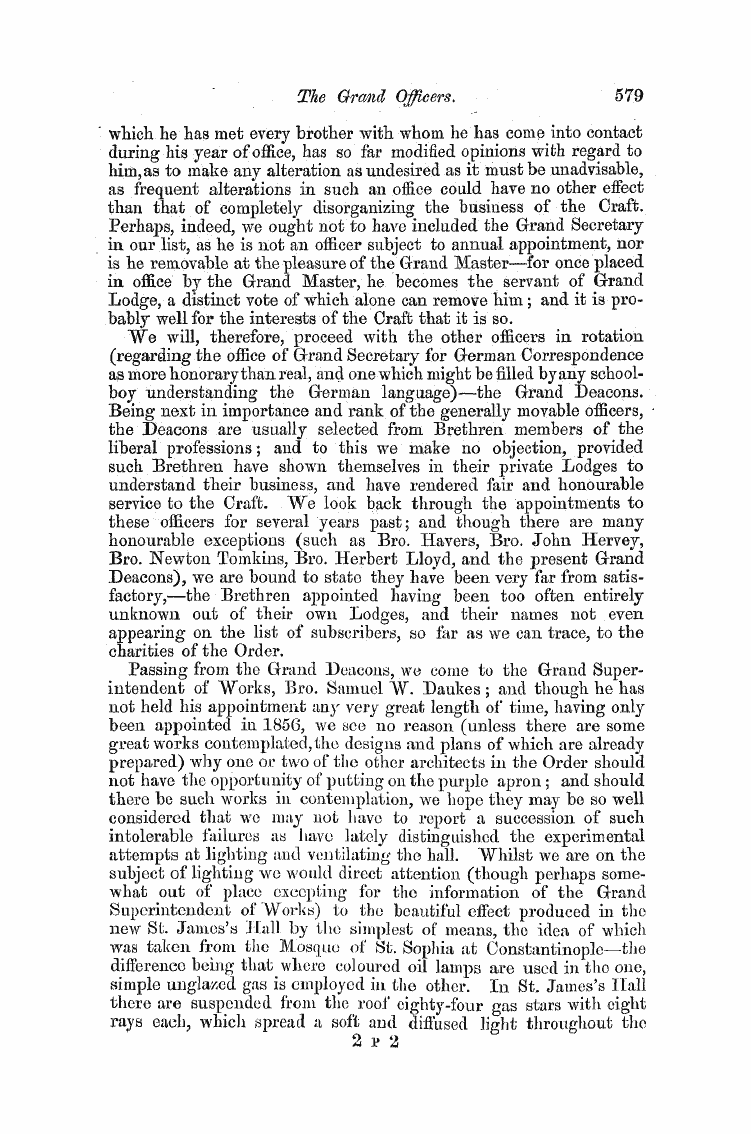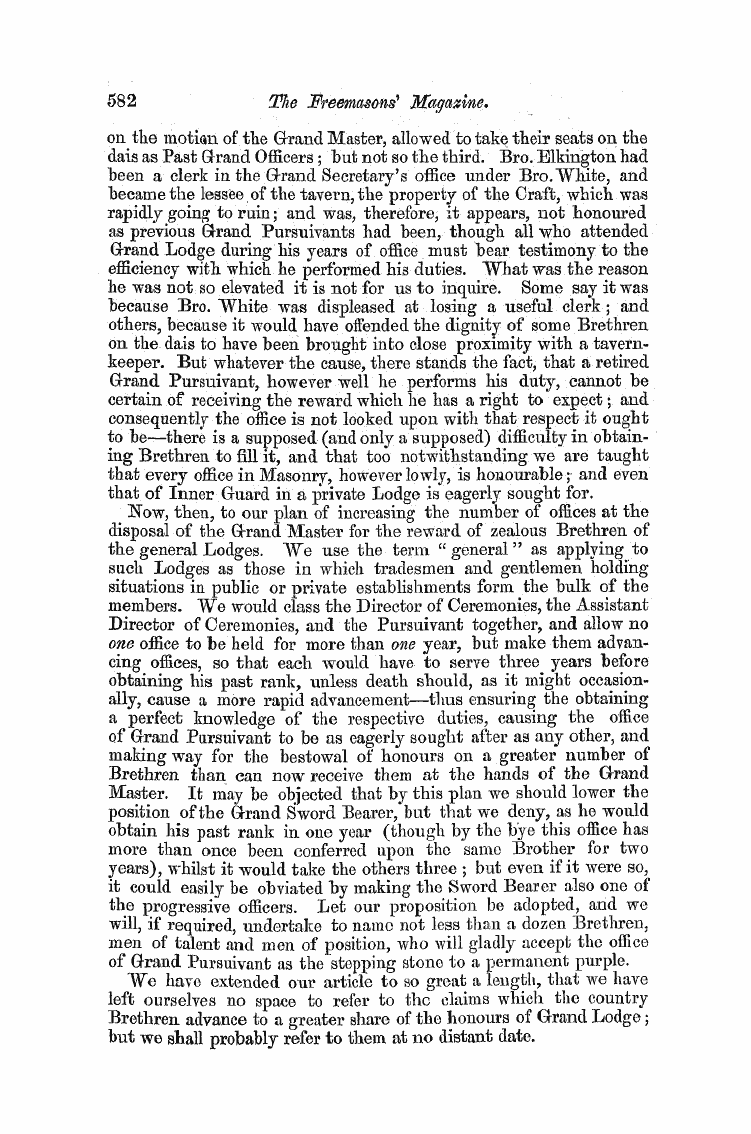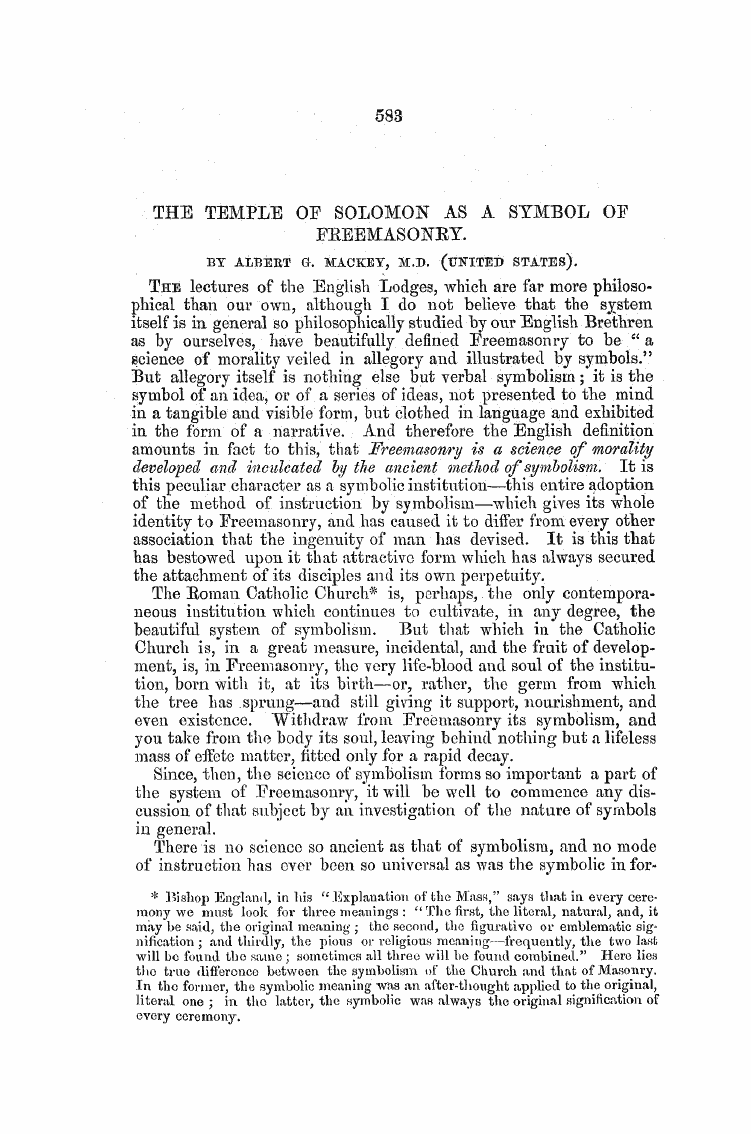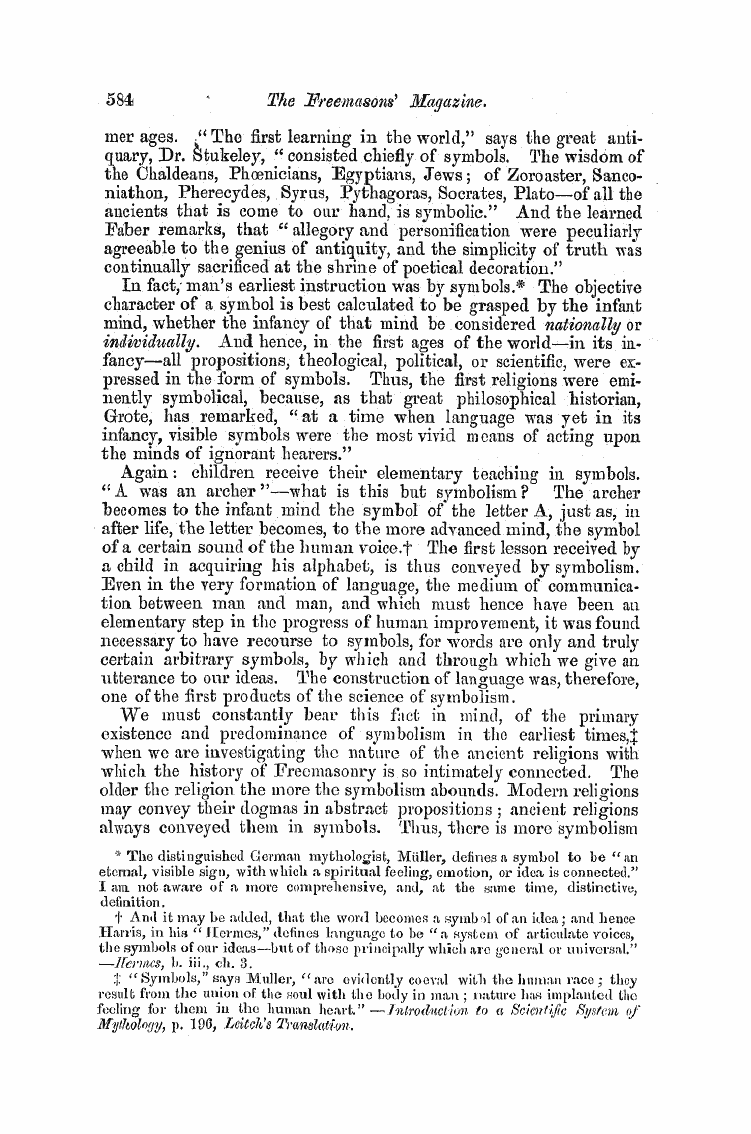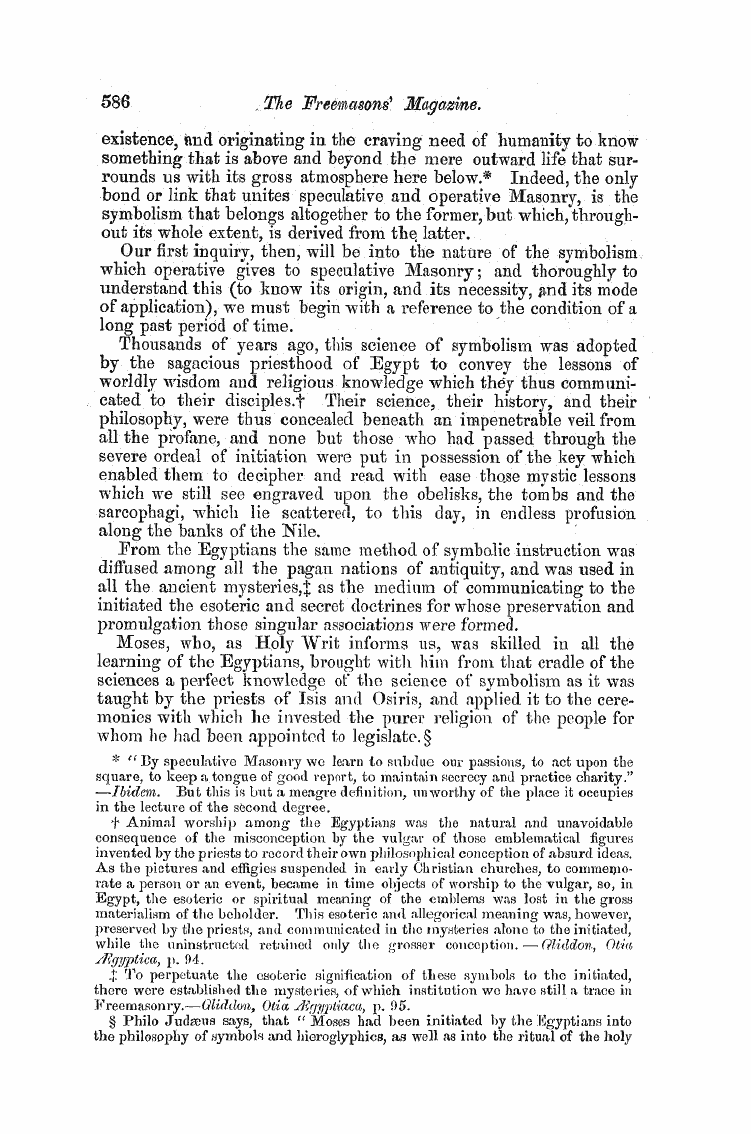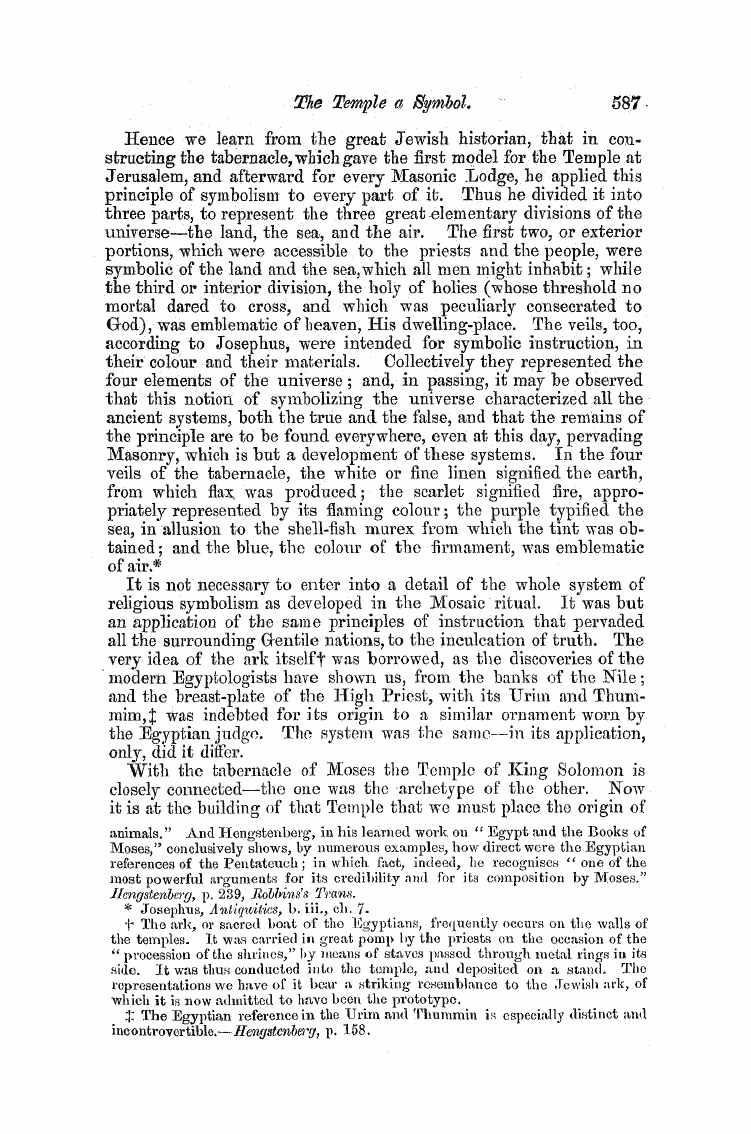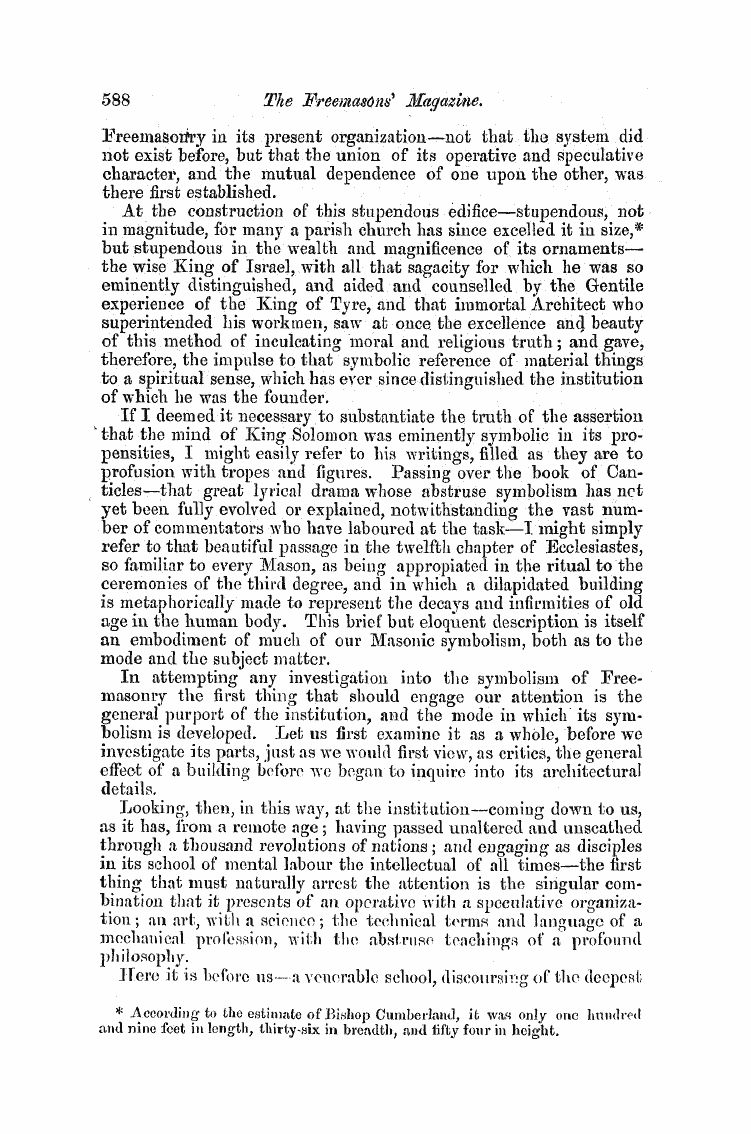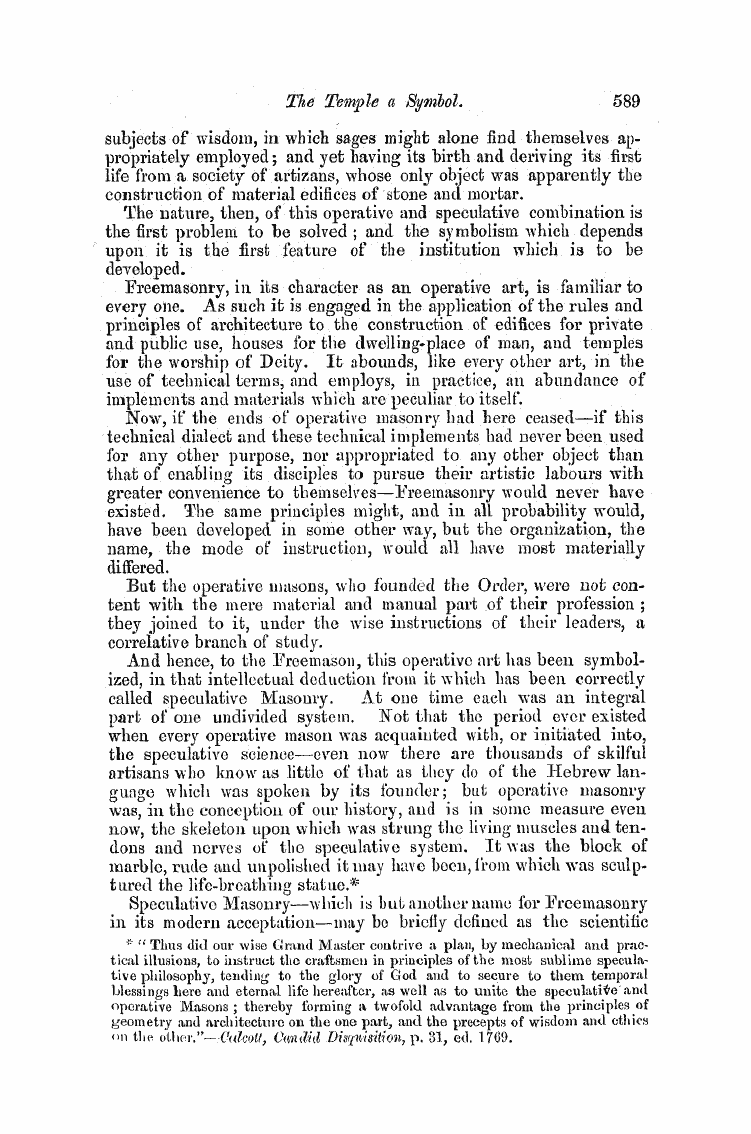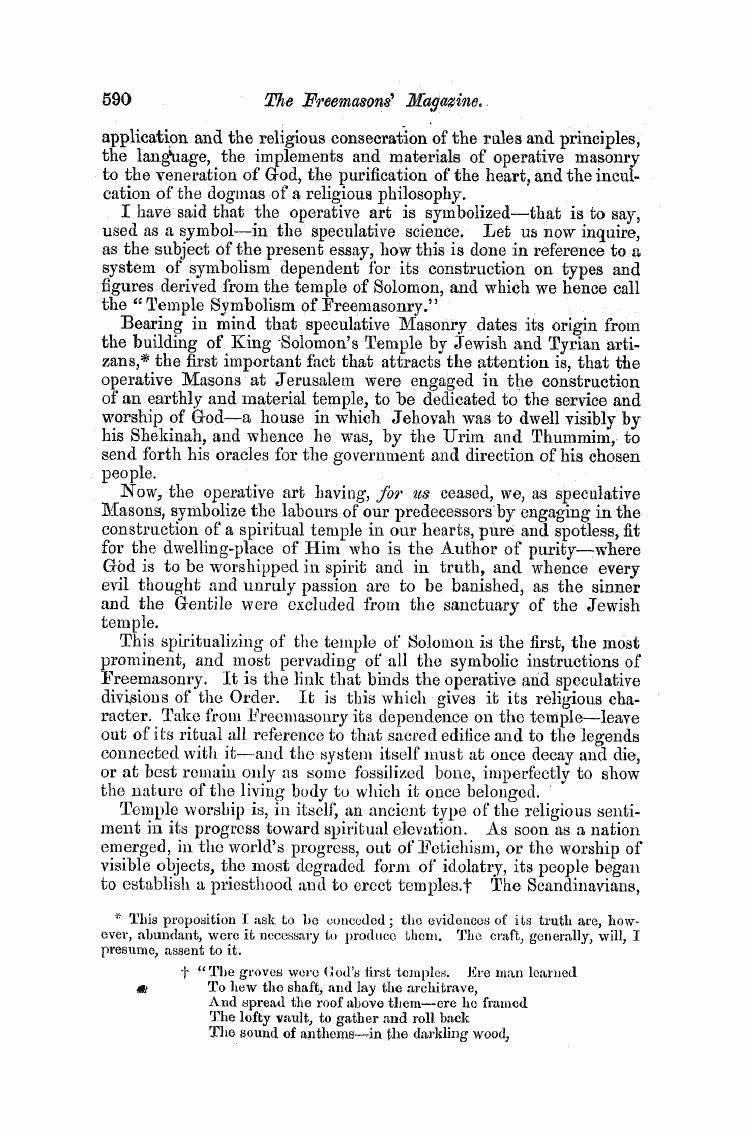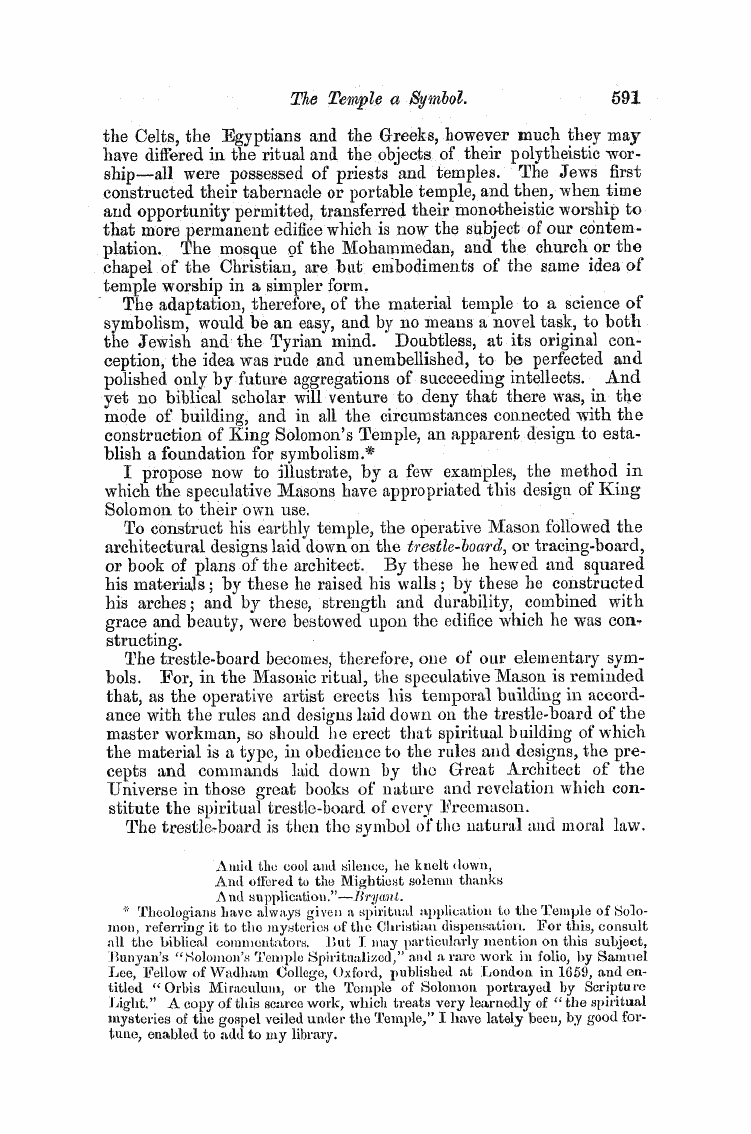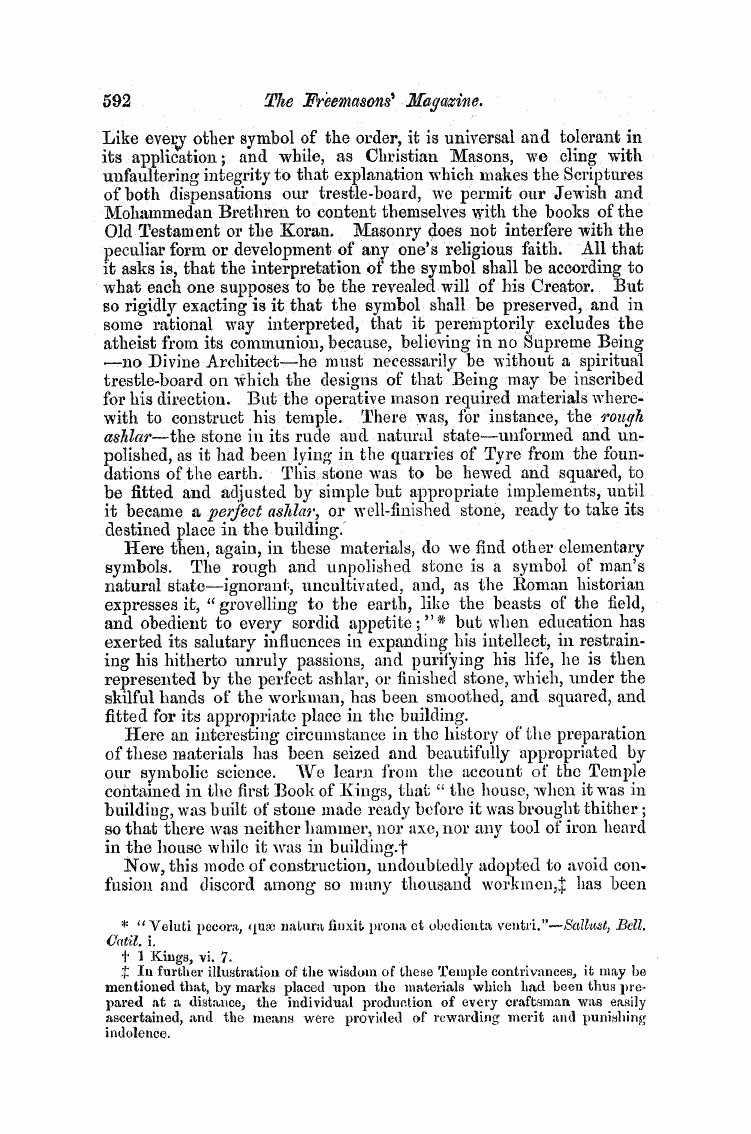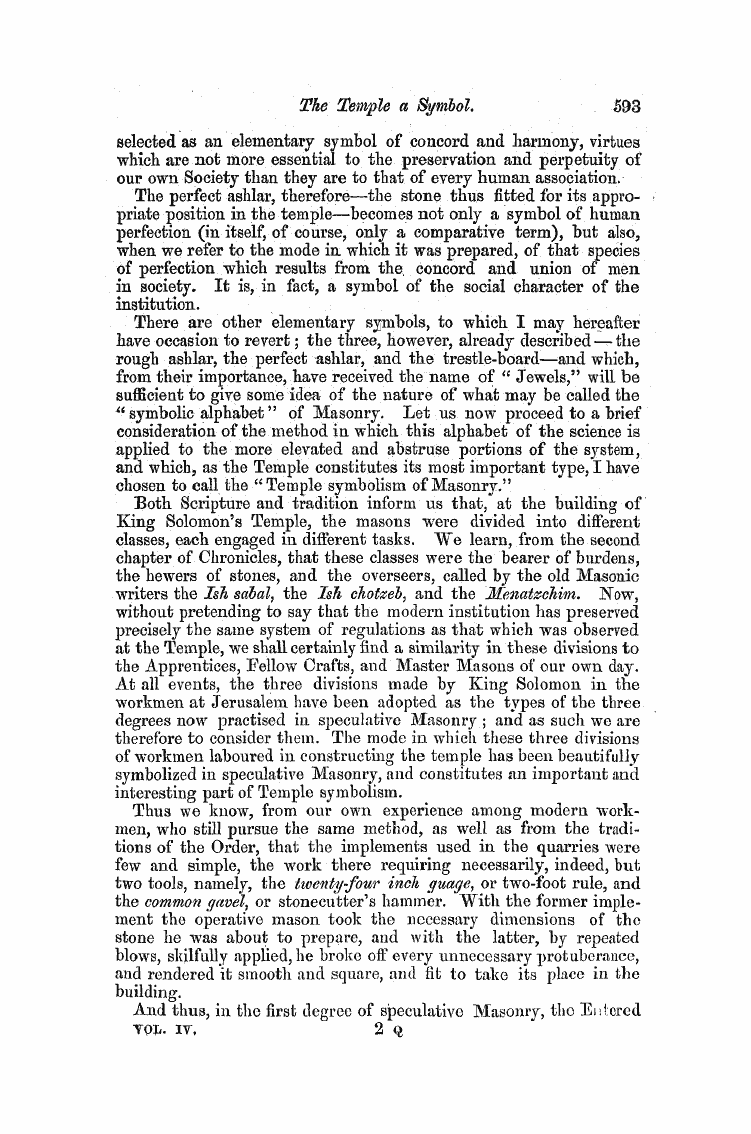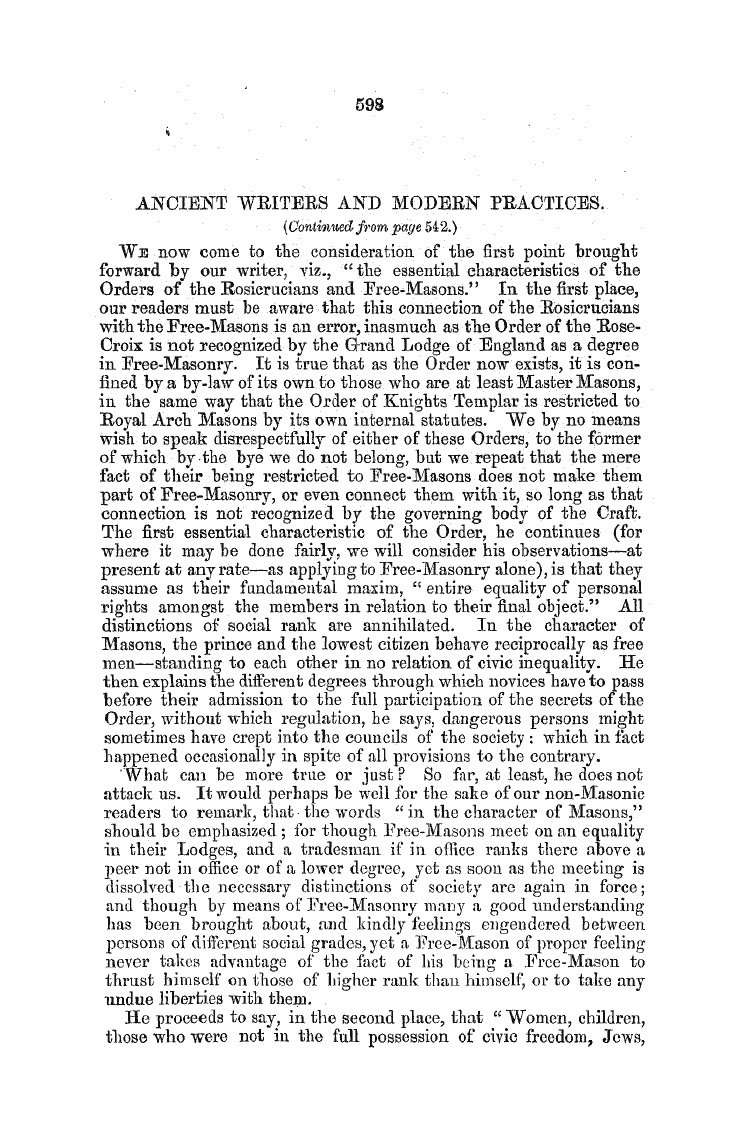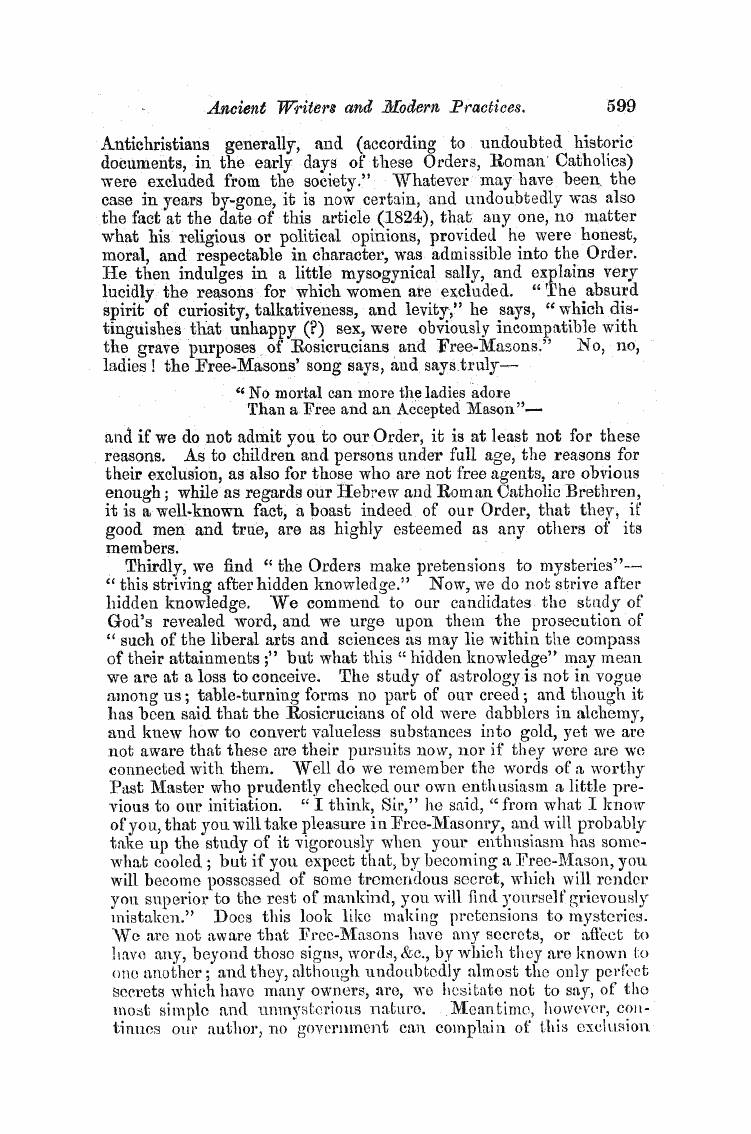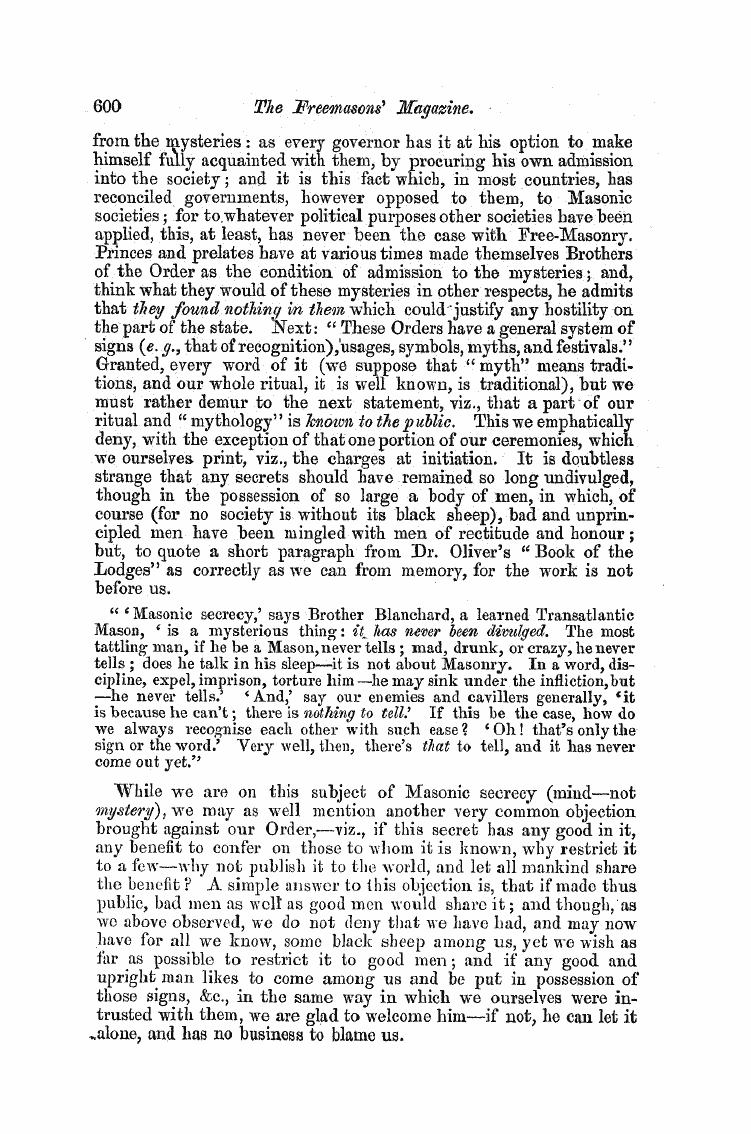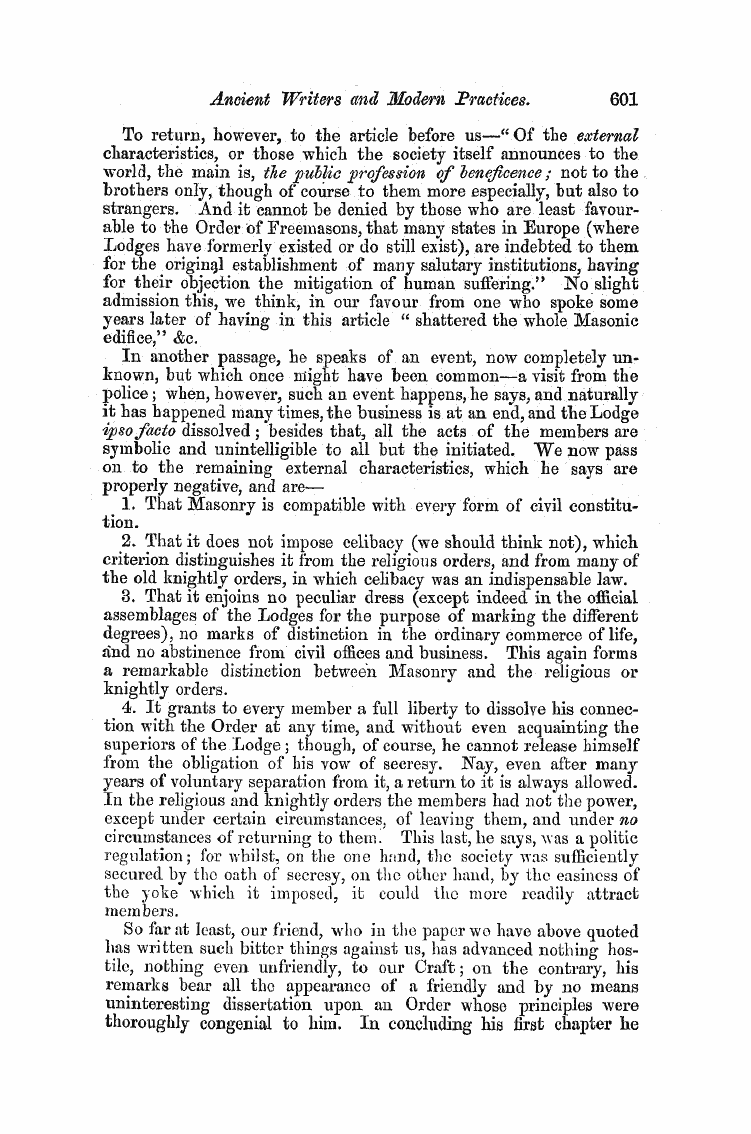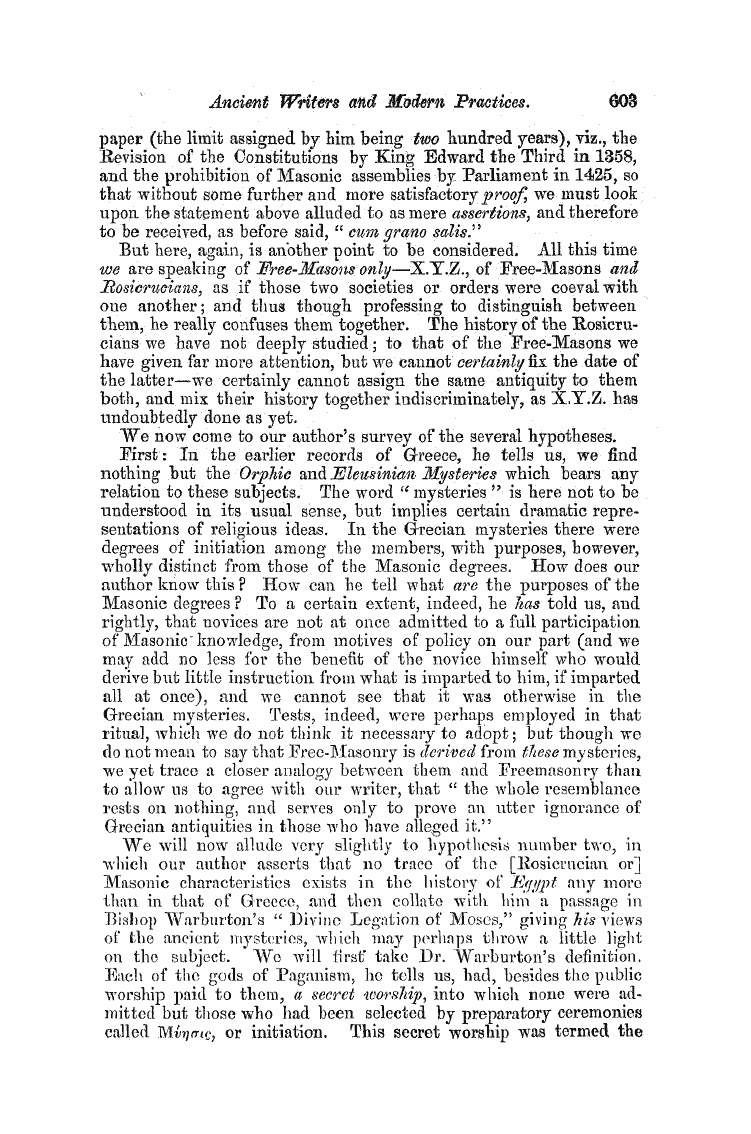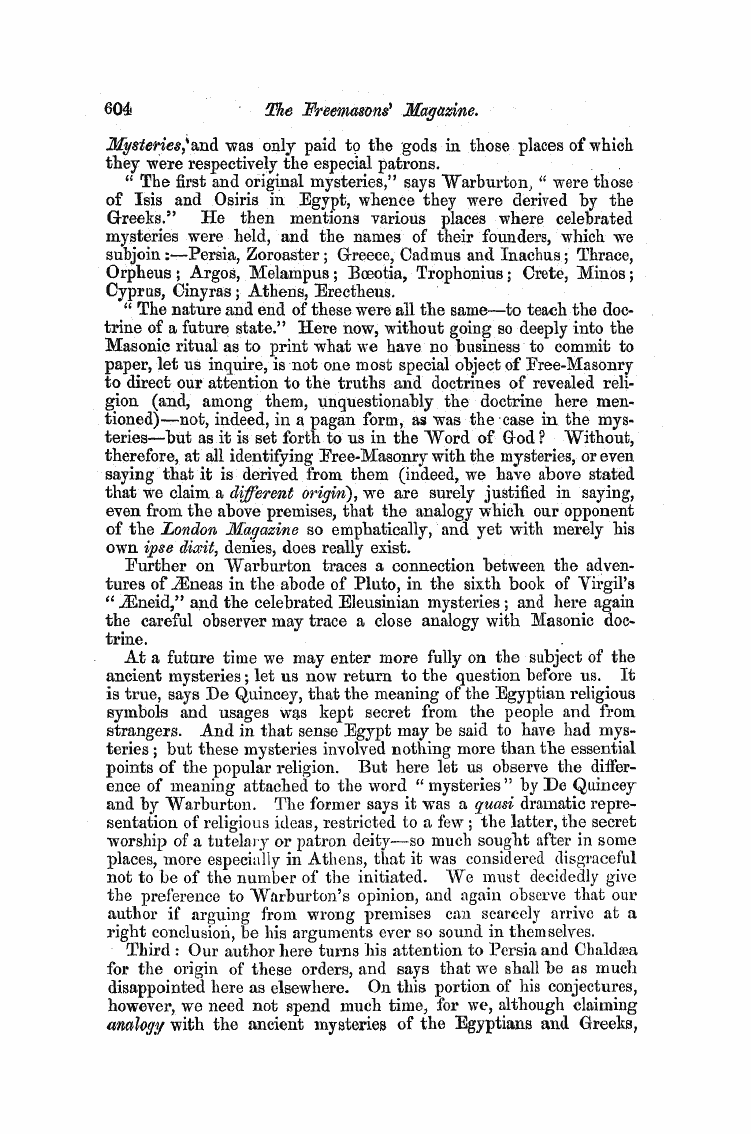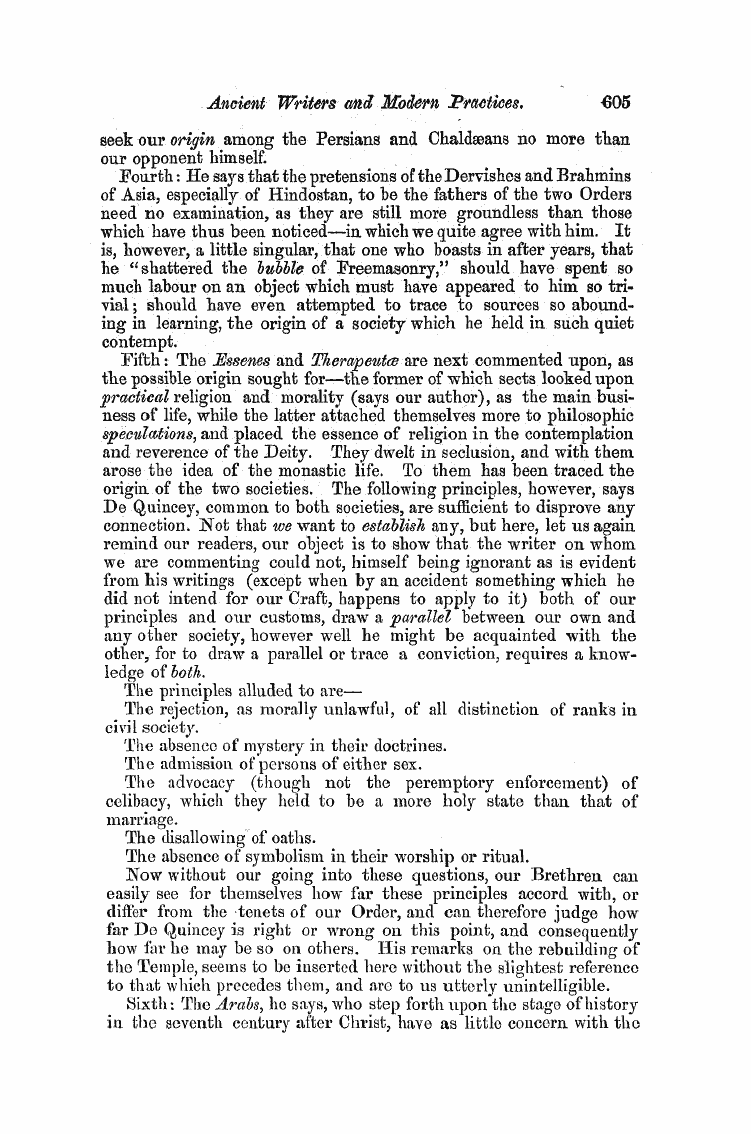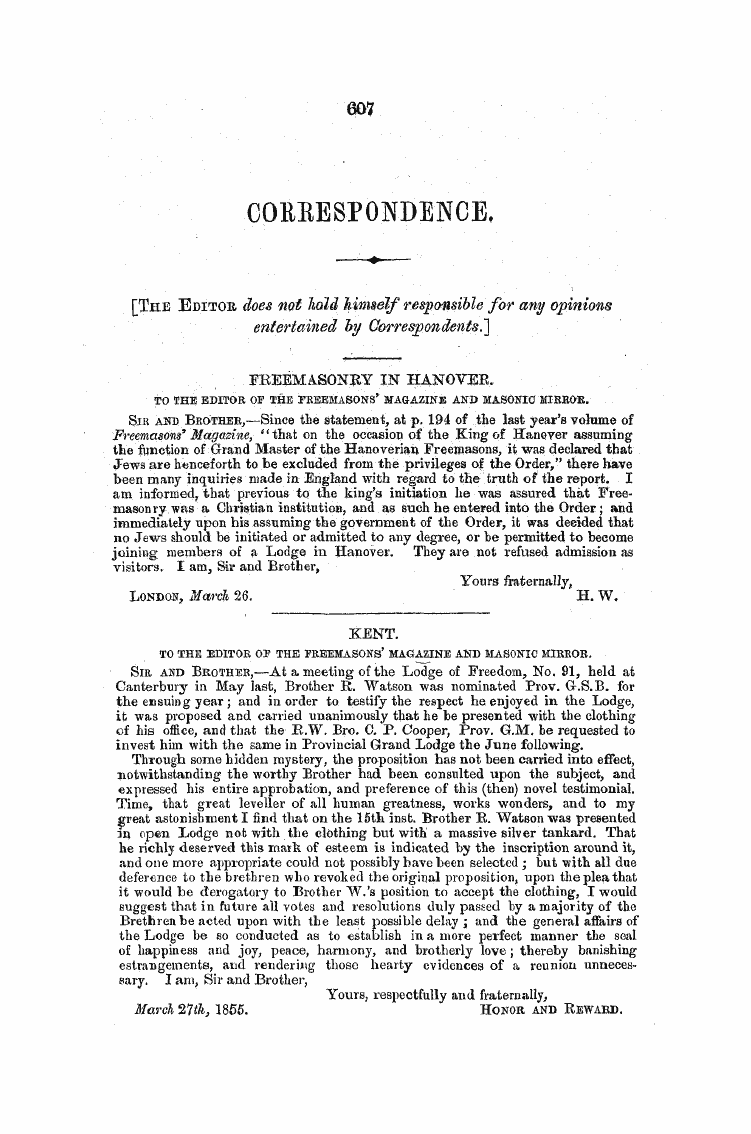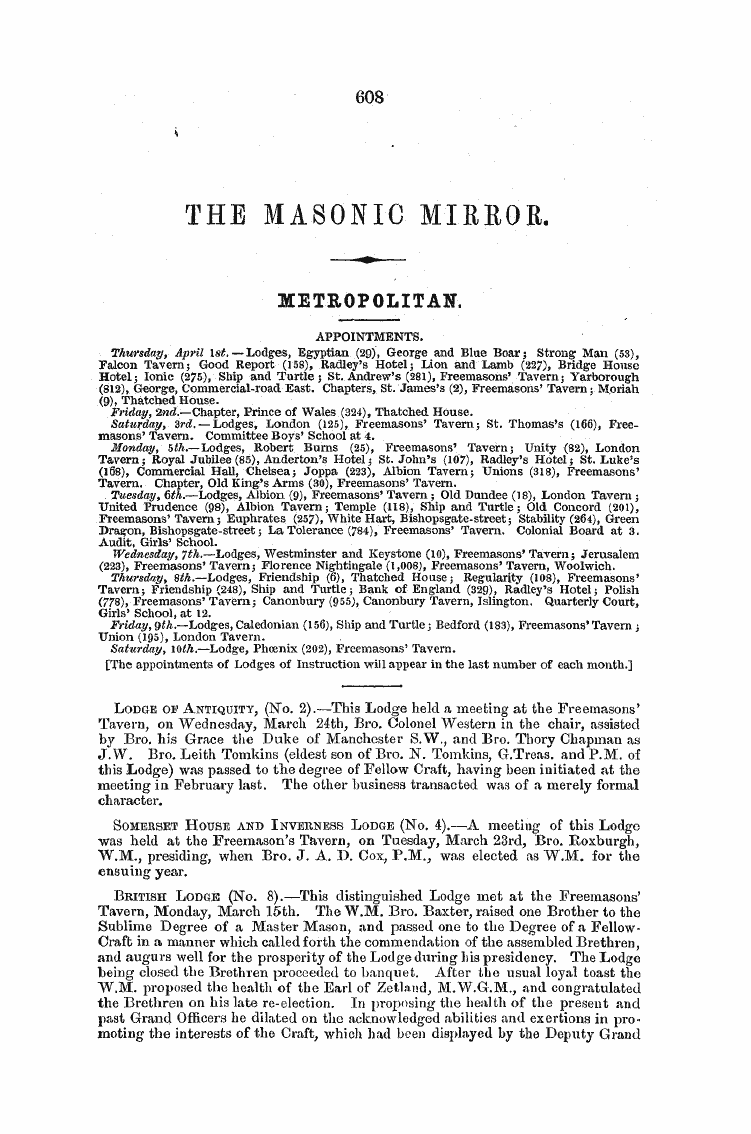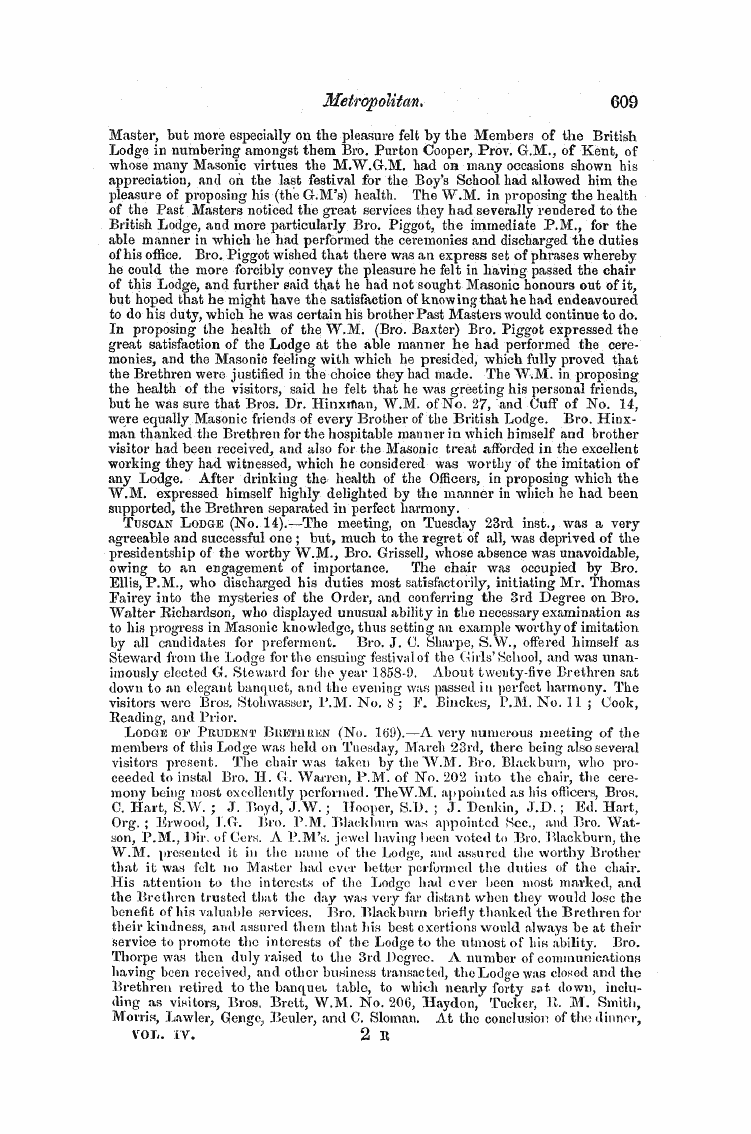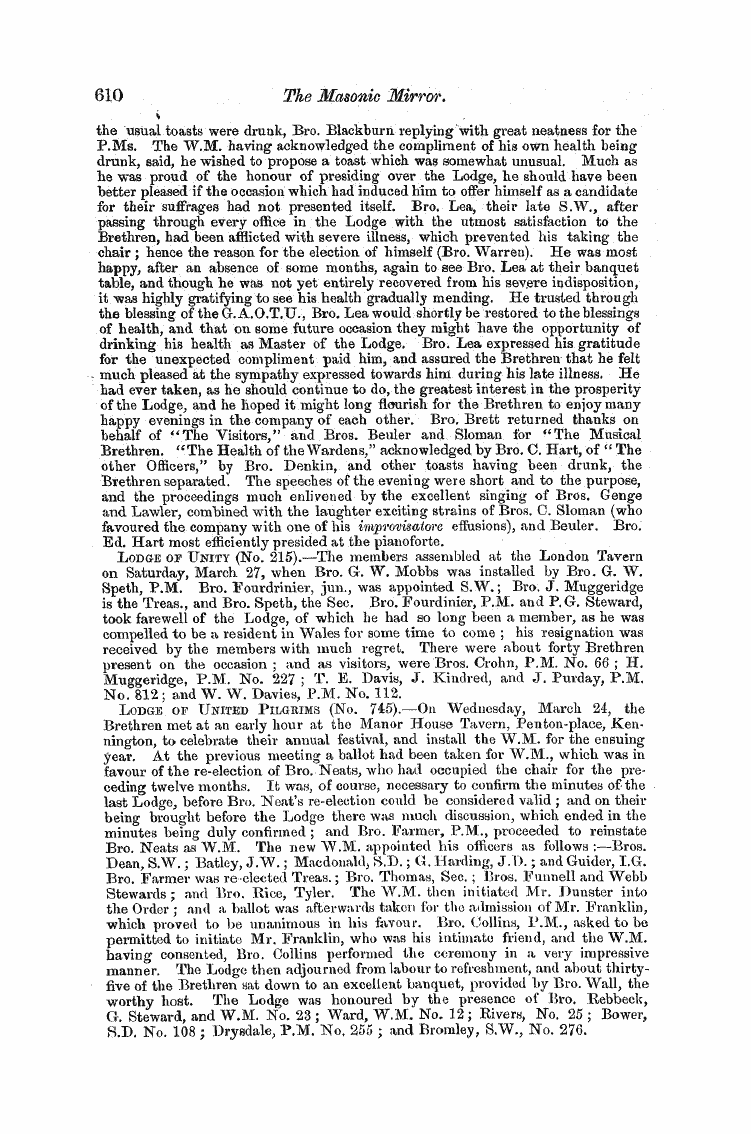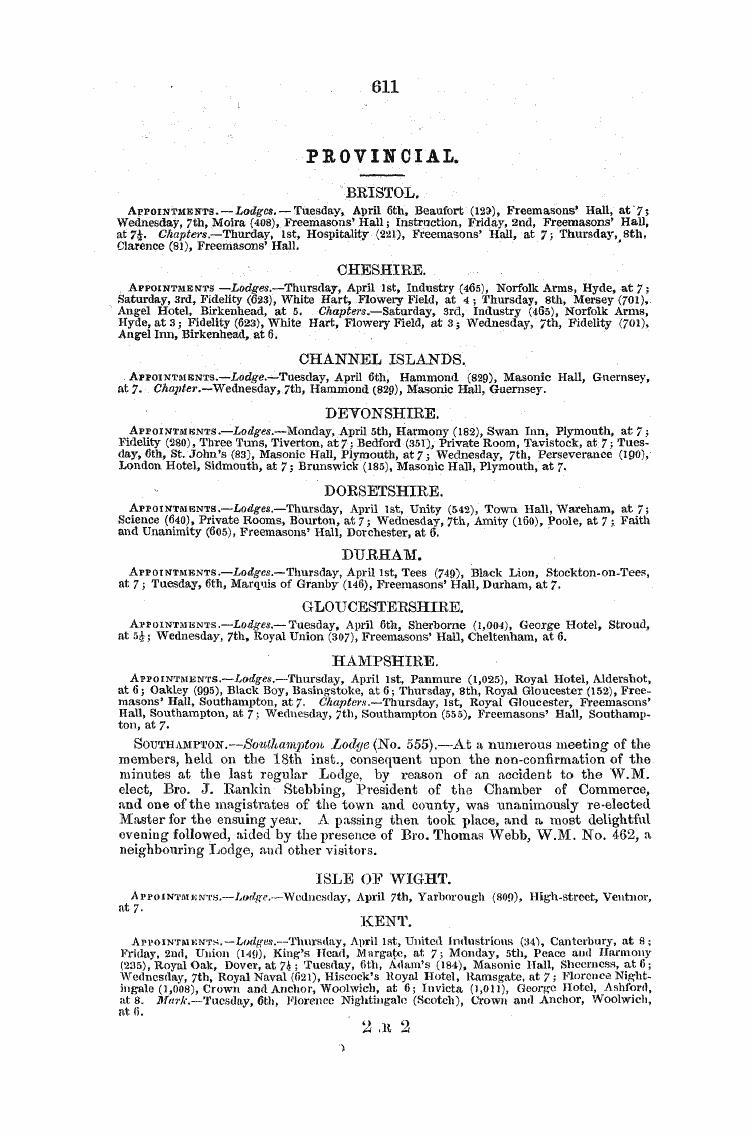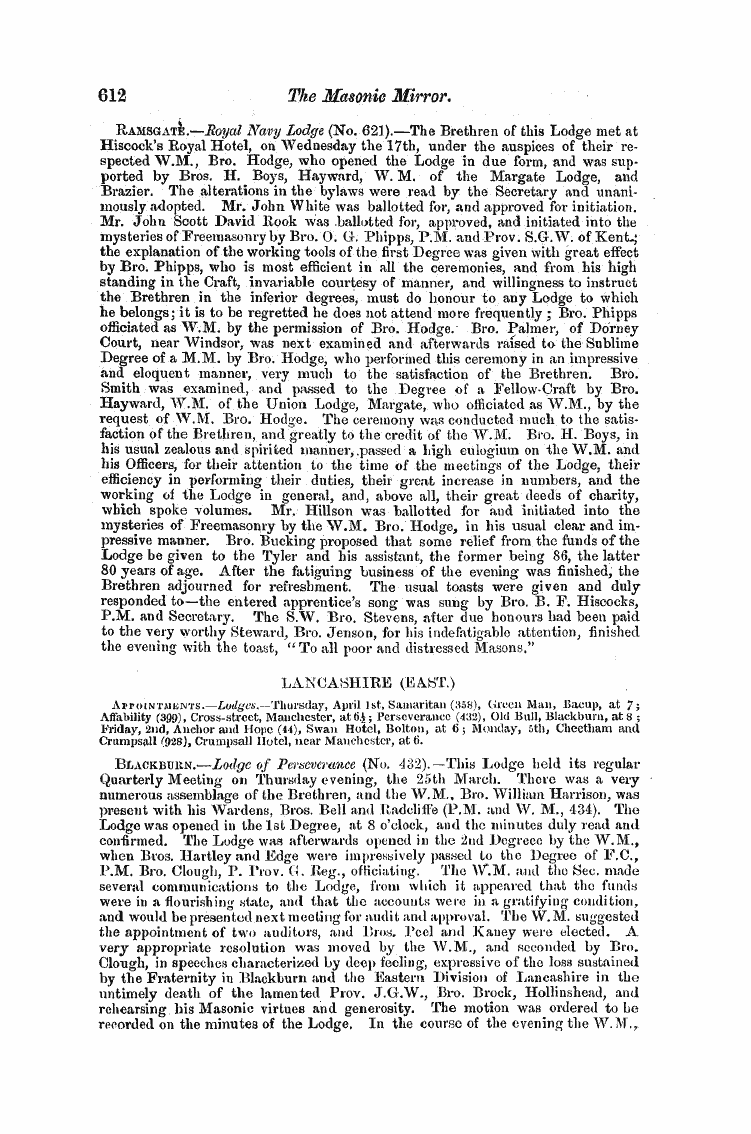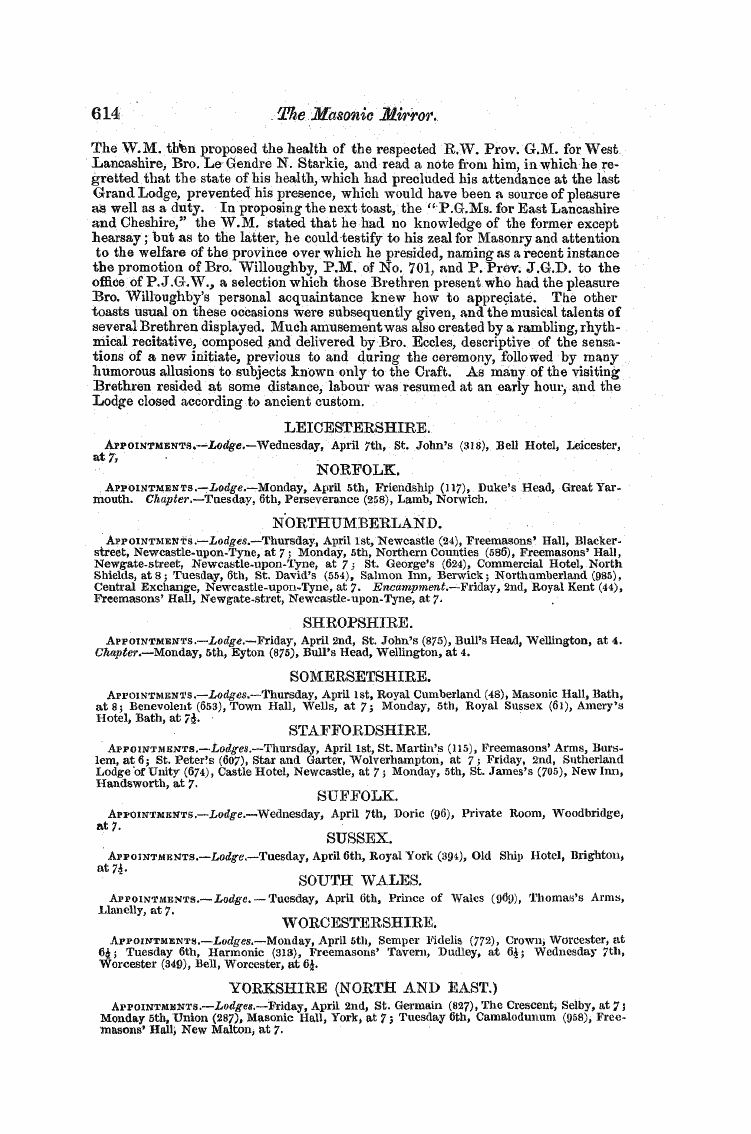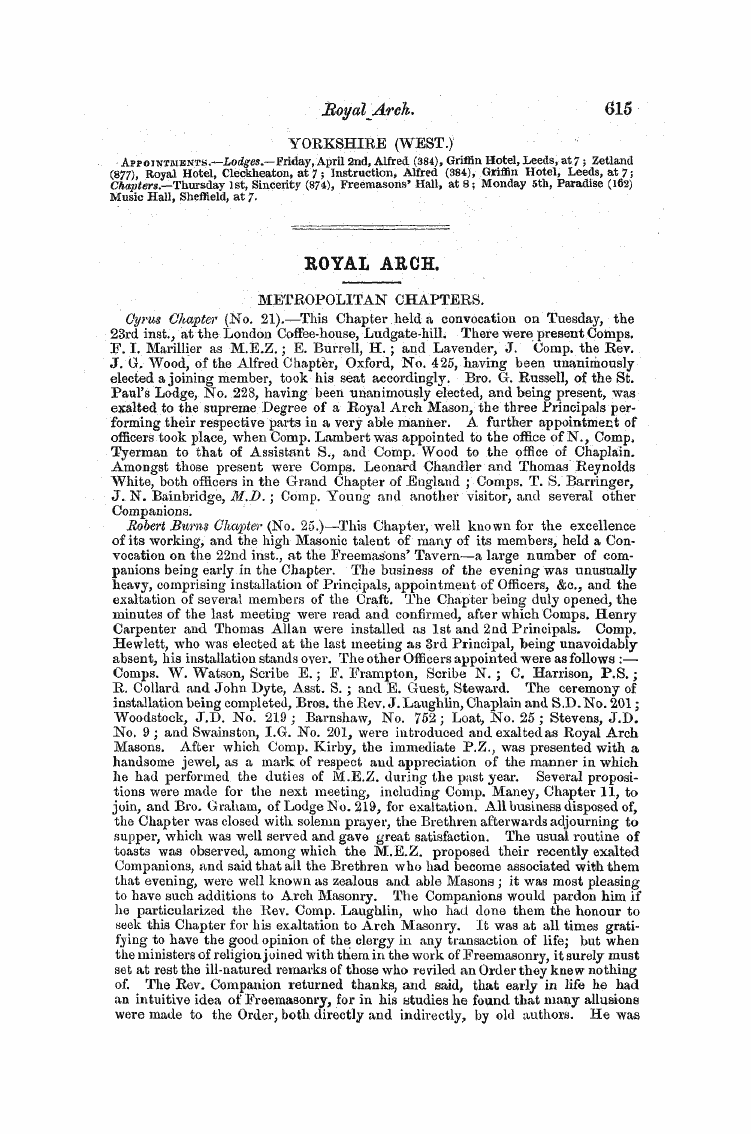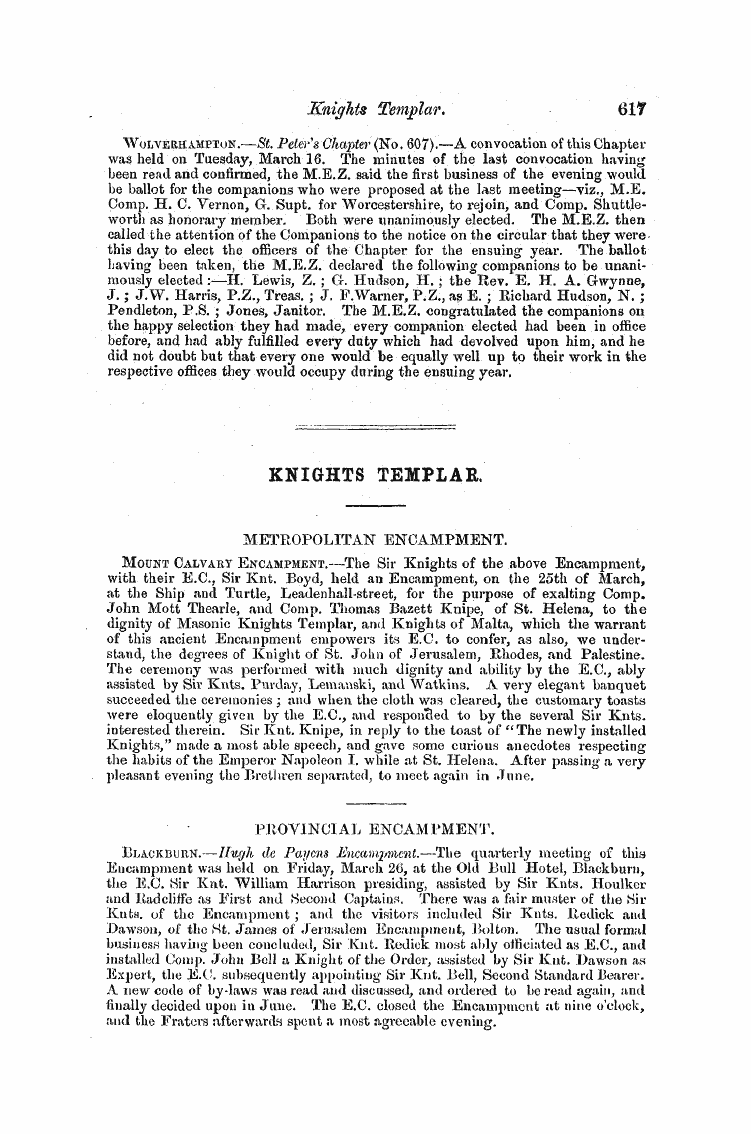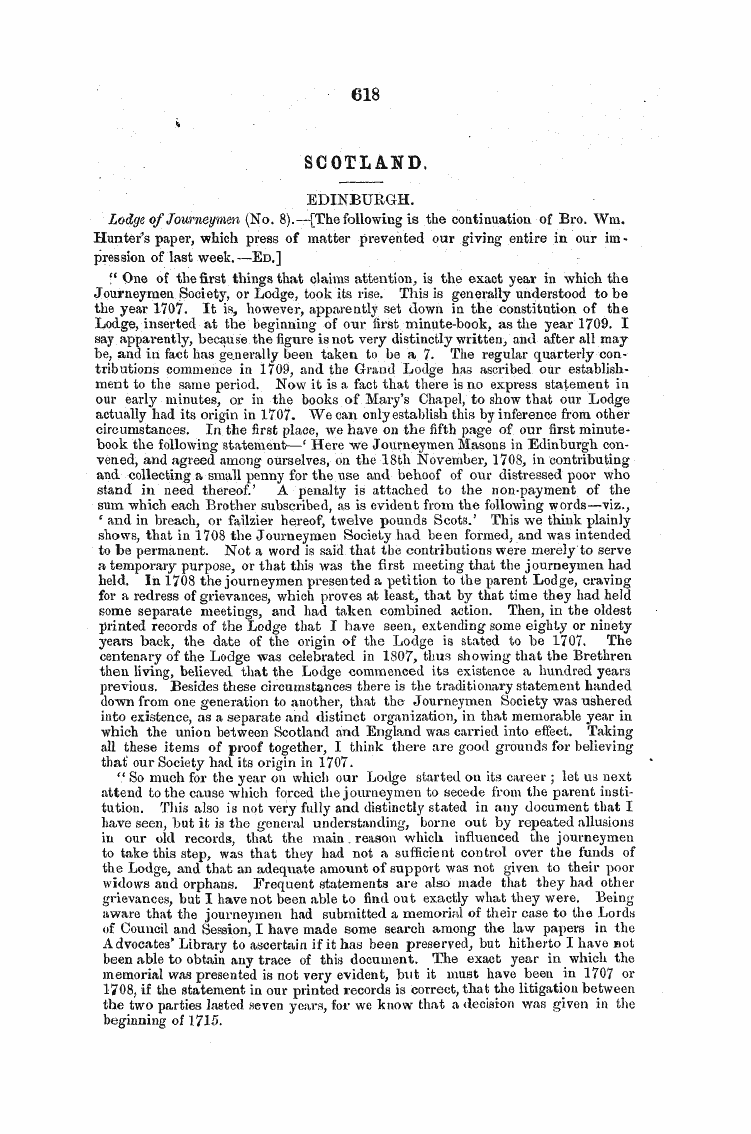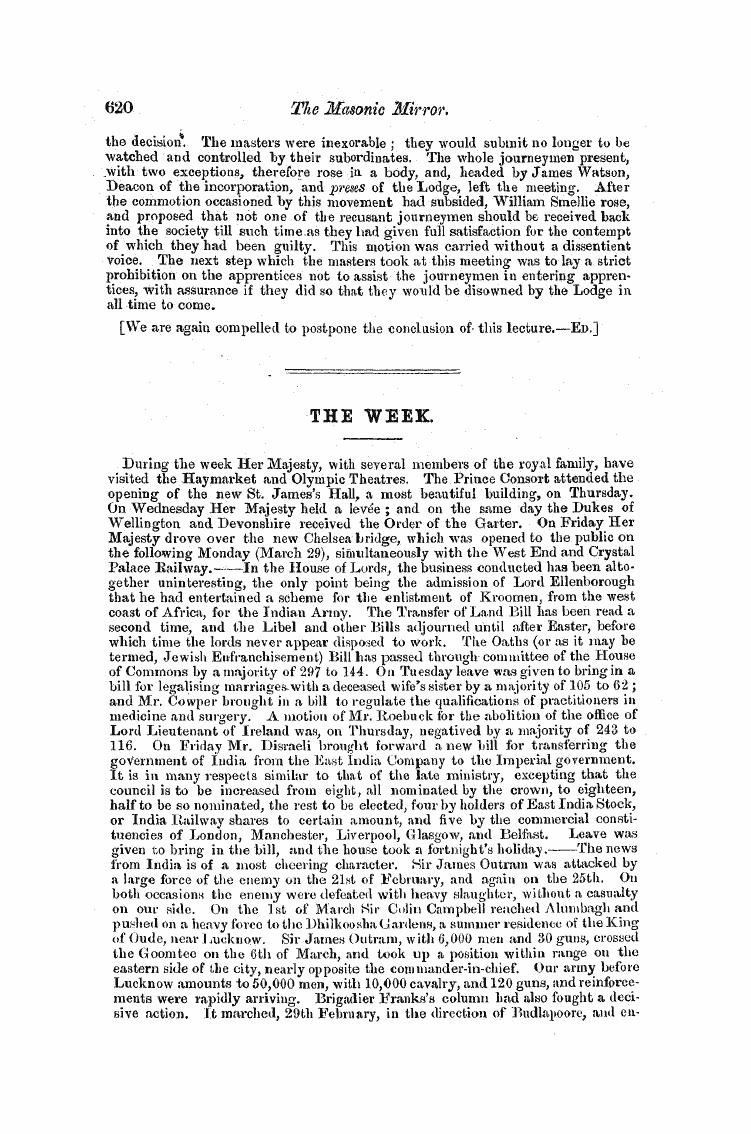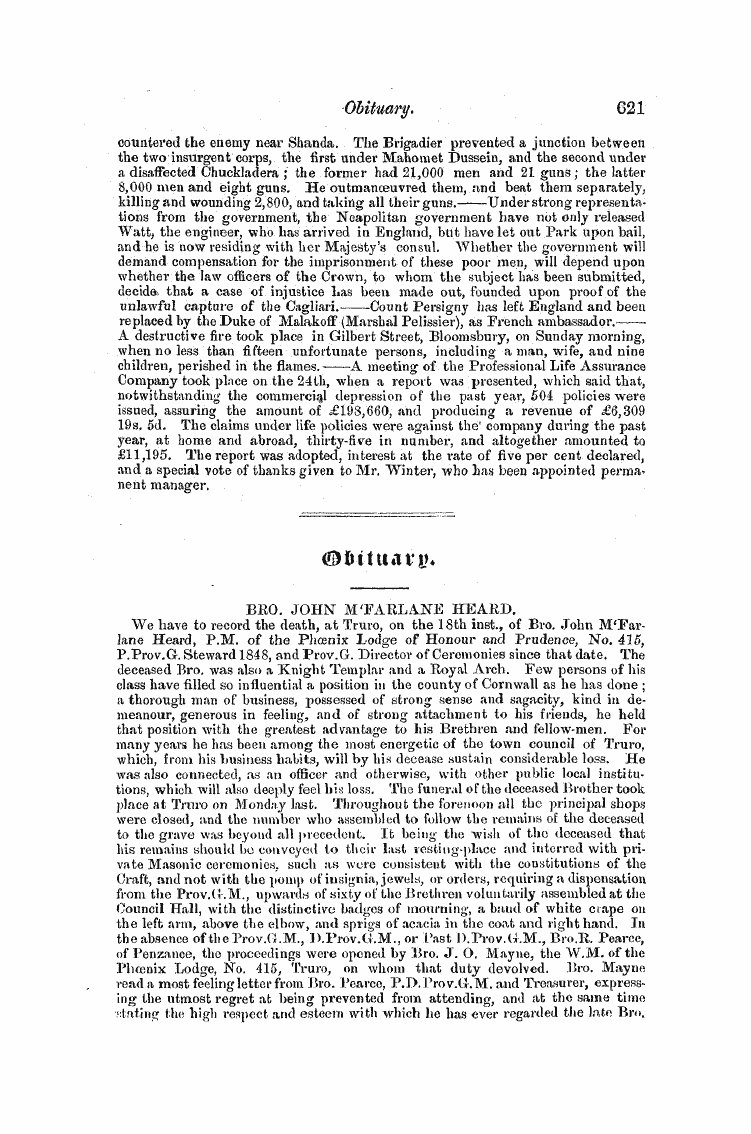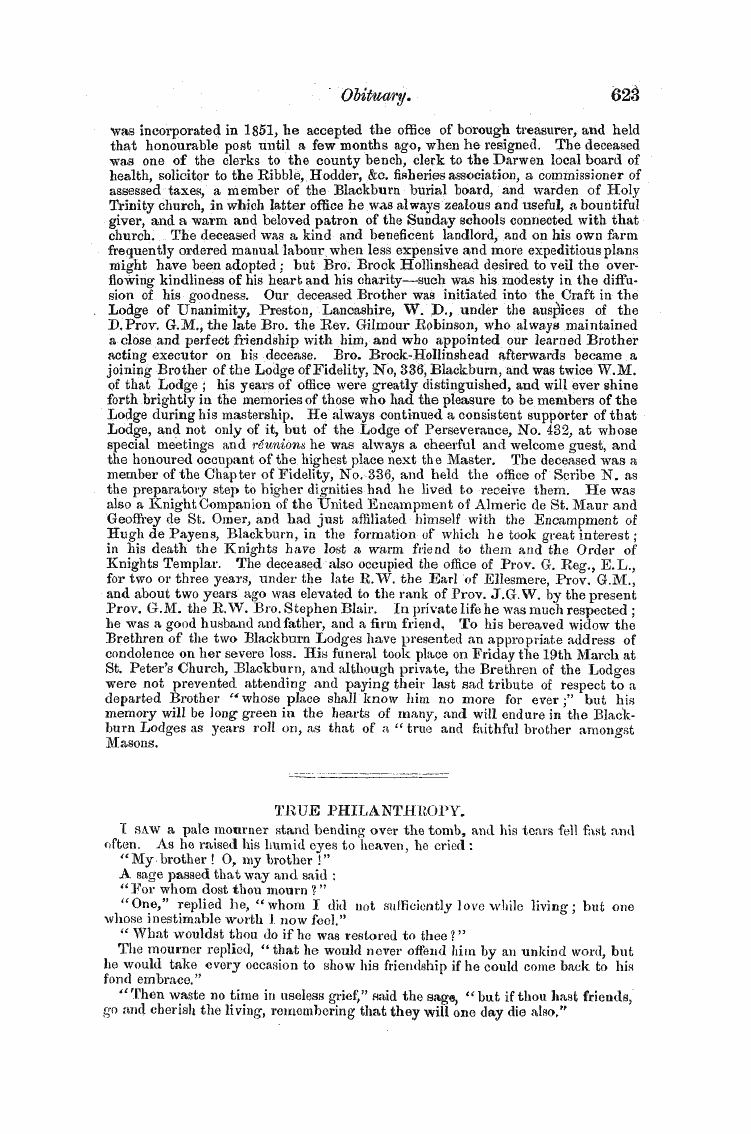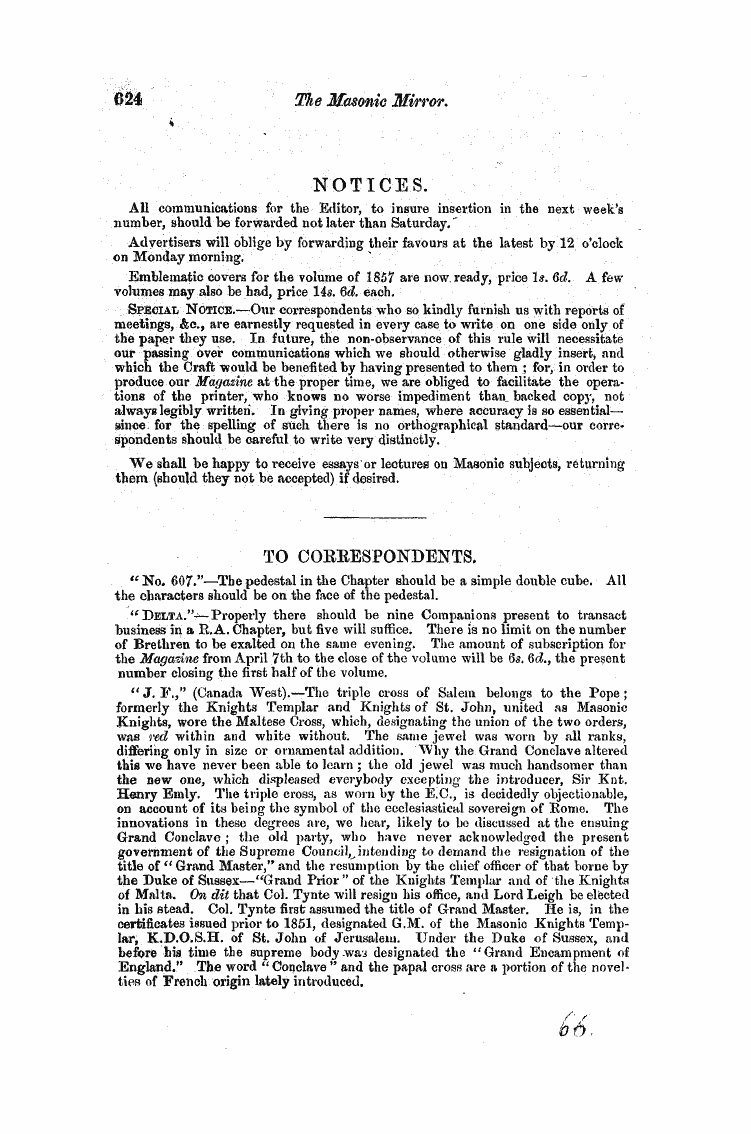-
Articles/Ads
Article COIRESPGNDENCE. ← Page 4 of 11 →
Note: This text has been automatically extracted via Optical Character Recognition (OCR) software.
Coirespgndence.
But the extent tof a Mason ' s Lodge is said to be unbounded , and therefore Freemasonry— of which the Lodg-e is a type , as the Church is a type of Christianityis universal also . The syllogism appears perfect , but a slight consideration will show that the minor is defective . The Lodge is by no means unbounded , even in its most extended acceptation , viz ., from the earth to the heavens ; from the east
to the west ; between the north and the south ; and from the surface to the centre . Th £ heavens which are referred to in this definition can only mean , strictly speaking , the atmospheric heavens , and therefore the Lodge cannot be a type of the entire universe ; and although it is said to extend from the east to the west , it is still bounded by some imaginary limit between , the north and the south ; and consequently the argument is inconclusive , and of no value as an evidence of Masonic universality .
2 nd . Again . It is contended that as we acknowledge no religious creed , but admit , without inquiry , the members of every system on the face of the earth as candidates for initiation , the Order cannot but partake of that universal brotherhood which classes all mankind as the children of a common Parent , without any distinction of ¦ rank , character , country , or profession . Now even if the terms of this argument were true , it wxmld not be sufficiently cogent to establish the proposition of an absolute universality . But I must demur to its fundamental principles , for Masonry does acknowledge a religious creed in its frequent invocations of the Redeemer under the names of the Great Architect and Geometrician of
the Universe ; and , according to the belief of our Protestant Brethren since the Reformation , our doctrines are commensurate with those contained in the Book of Common Prayer use pi by the Anglican Church , for it then formed a necessary part of the furniture of our Lodges , along with the Holy Bible ; and anterior to that event , as is plainly evinced by the Constitutions of Athelstan , Freemasonry was intimately linked with ecclesiastical observances ; and the Brethren of all classes and degrees were strictly enjoined to habitually attend the Christian church and sacrament , as I shall presently show .
Freemasonry is not a proselytizing institution , for we invite no one to become a partaker of our mysteries ; and therefore it is truly stated that a religious test is never required for admission amongst us . Nor is it a sine qua non with any other religious institution . For instance , if a person is desirous of uniting himself with any body of professing Christians , he may , or he may not , avow himself to be a JeWj a Turk , or a heathen—a churchman , a unitarian , or a methodist , —for no such profession will constitute a bar to his acceptance . So in Freemasonry ; a
candidate may be of any of the above persuasions ; he may profess it or be silent , at his pleasure . No questions will assuredly be asked ; he is only required to avow his faith in the G . A . O . T . TJ . But , from the moment of his initiation , he becomes a genuine Christian , if he were not so before , by subscribing , ex animo , to our Christian lectures , which , as I have already observed , he openly sanctions and approves by the unmistakable evidence of his presence from time to time , during their delivery .
3 rd , It is further urged that the universality of Masonry is proved by the fact that all persons are eligible for admission into the Order without any reference to their creed , country , or profession ; and it is for this reason that the lectures pronounce its influence to be unbounded . It might be confidently replied that the passage in the lectures , above referred
to—viz ., " the unbounded influence of its excellent rules and regulations , "—was unknown in the ancient rituals , and never introduced into the lectures of Masonry till the latter end of the eighteenth or the commencement of the nineteenth century . But such a course would be equivalent to evading the question
instead of answering it . An unbounded influence evidently implies that it is applicable at all times , under every variety of circumstances , and to all classes of society , however they may be constituted , and whatever be their situation , climate , or colour , in the different regions of the habitable globe . But does this characteristic correctly apply to an institution which is unknown , even byname , to one half the population of the world ? la the influence of Freemasonry felt in Siberhi ; in the wild and pathless steppes of Tartary ; amongst the American Indians , - or in China or Japan 1 Is
Note: This text has been automatically extracted via Optical Character Recognition (OCR) software.
Coirespgndence.
But the extent tof a Mason ' s Lodge is said to be unbounded , and therefore Freemasonry— of which the Lodg-e is a type , as the Church is a type of Christianityis universal also . The syllogism appears perfect , but a slight consideration will show that the minor is defective . The Lodge is by no means unbounded , even in its most extended acceptation , viz ., from the earth to the heavens ; from the east
to the west ; between the north and the south ; and from the surface to the centre . Th £ heavens which are referred to in this definition can only mean , strictly speaking , the atmospheric heavens , and therefore the Lodge cannot be a type of the entire universe ; and although it is said to extend from the east to the west , it is still bounded by some imaginary limit between , the north and the south ; and consequently the argument is inconclusive , and of no value as an evidence of Masonic universality .
2 nd . Again . It is contended that as we acknowledge no religious creed , but admit , without inquiry , the members of every system on the face of the earth as candidates for initiation , the Order cannot but partake of that universal brotherhood which classes all mankind as the children of a common Parent , without any distinction of ¦ rank , character , country , or profession . Now even if the terms of this argument were true , it wxmld not be sufficiently cogent to establish the proposition of an absolute universality . But I must demur to its fundamental principles , for Masonry does acknowledge a religious creed in its frequent invocations of the Redeemer under the names of the Great Architect and Geometrician of
the Universe ; and , according to the belief of our Protestant Brethren since the Reformation , our doctrines are commensurate with those contained in the Book of Common Prayer use pi by the Anglican Church , for it then formed a necessary part of the furniture of our Lodges , along with the Holy Bible ; and anterior to that event , as is plainly evinced by the Constitutions of Athelstan , Freemasonry was intimately linked with ecclesiastical observances ; and the Brethren of all classes and degrees were strictly enjoined to habitually attend the Christian church and sacrament , as I shall presently show .
Freemasonry is not a proselytizing institution , for we invite no one to become a partaker of our mysteries ; and therefore it is truly stated that a religious test is never required for admission amongst us . Nor is it a sine qua non with any other religious institution . For instance , if a person is desirous of uniting himself with any body of professing Christians , he may , or he may not , avow himself to be a JeWj a Turk , or a heathen—a churchman , a unitarian , or a methodist , —for no such profession will constitute a bar to his acceptance . So in Freemasonry ; a
candidate may be of any of the above persuasions ; he may profess it or be silent , at his pleasure . No questions will assuredly be asked ; he is only required to avow his faith in the G . A . O . T . TJ . But , from the moment of his initiation , he becomes a genuine Christian , if he were not so before , by subscribing , ex animo , to our Christian lectures , which , as I have already observed , he openly sanctions and approves by the unmistakable evidence of his presence from time to time , during their delivery .
3 rd , It is further urged that the universality of Masonry is proved by the fact that all persons are eligible for admission into the Order without any reference to their creed , country , or profession ; and it is for this reason that the lectures pronounce its influence to be unbounded . It might be confidently replied that the passage in the lectures , above referred
to—viz ., " the unbounded influence of its excellent rules and regulations , "—was unknown in the ancient rituals , and never introduced into the lectures of Masonry till the latter end of the eighteenth or the commencement of the nineteenth century . But such a course would be equivalent to evading the question
instead of answering it . An unbounded influence evidently implies that it is applicable at all times , under every variety of circumstances , and to all classes of society , however they may be constituted , and whatever be their situation , climate , or colour , in the different regions of the habitable globe . But does this characteristic correctly apply to an institution which is unknown , even byname , to one half the population of the world ? la the influence of Freemasonry felt in Siberhi ; in the wild and pathless steppes of Tartary ; amongst the American Indians , - or in China or Japan 1 Is

































































































































































































